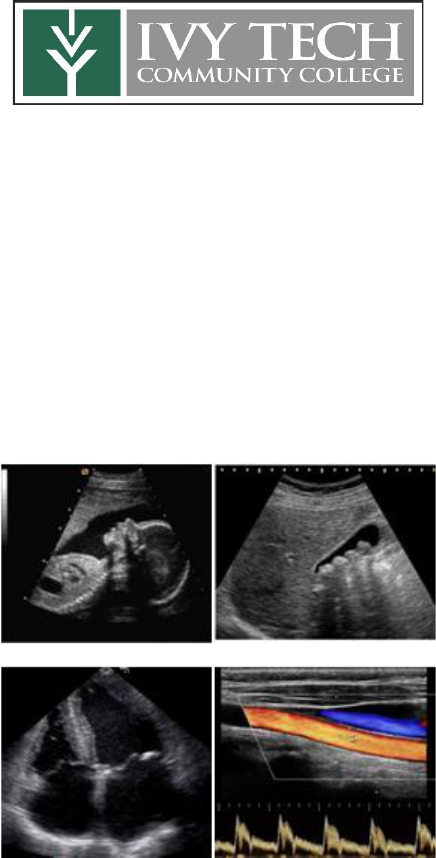
Terre Haute
Diagnostic Medical
SONOGRAPHY PROGRAM
Program Information
Terre Haute Campus
P a g e | 2
DMSI Application Packet – Revised February 2024
Overall Program Information
The following pages contain a large amount of information about
the program. Please read all the information included. If you email
the program regarding the information already in this packet, you
will be referred to this packet.
Remember- sonography is a detail profession with a great amount
of responsibility and willingness to learn and investigate. In all
healthcare professions, you must be able to follow directions and be
observant. Please pay attention and carefully read the information
as all of this is important to the process and your decision to apply
to the program.
P a g e | 3
DMSI Application Packet – Revised February 2024
Dear Interested Candidate:
Thank you for your interest in the Sonography Program at Ivy Tech Community College in Terre Haute.
This packet provides a brief description of the profession, admission and application procedures, basic
information about the program and frequently asked questions. Please read this thoroughly and follow all
directions.
Our college is accredited by the North Central Association of Colleges. The Ivy Tech Community College
Terre Haute Diagnostic Medical Sonography program is accredited by the Commission on
Accreditation of Allied Health Education Programs (www.caahep.org) upon the recommendation of
the Accreditation Committee for Educational Programs for Diagnostic Medical Sonography (JRC-
DMS). Our program is accredited for the general (Abdominal Extended & OB/Gyn), vascular and
adult echocardiography concentrations.
The mission of the Diagnostic Medical Sonography Concentration at Ivy Tech Community College, Terre
Haute is to provide a competency based educational experience that reflects the accepted standards of the
profession and provides students with the knowledge, skills, and attitudes necessary to enter the workforce as
an entry-level sonographer.
Sonography is truly an exciting field in healthcare; it is growing and changing every year. We want to help
you with your goals to become a part of this healthcare team. Please carefully read through all the
information in this packet. This application packet is the most current and replaces any other previously
printed application packet.

P a g e | 4
DMSI Application Packet – Revised February 2024
Diagnostic Medical Sonography
DEGREE AVAILABLE:
Associate Applied of Science
CONCENTRATIONS AVAILABLE:
General (Abdominal Extended and OB/Gyn
Sonography
Vascular Sonography
Cardiac Sonography
ACCREDITATION:
The Ivy Tech Community College (Terre
Haute) Diagnostic Medical Sonography
program is accredited by the Commission
on Accreditation of Allied Health Education
Programs (www.caahep.org) upon the
recommendation of the Accreditation
Committee for Educational Programs for
Diagnostic Medical Sonography (JRC-
DMS). The program is accredited in the
general (Abdominal Extended and
OB/Gyn), vascular and adult
echocardiography concentration.
Accreditation status can be found at
http://www.caahep.org/Find-An-
Accredited-Program/.
CAAHEP
25400 US HWY 19 North, Suite 158,
Clearwater, FL 33763, Phone 727-210-
2350 Fax- 727-210-2354
Caahep.org
JRC-DMS
6021 University Boulevard, Suite
500Ellicott City, MD 21043, 443-973-3251
(phone) | 866-738-3444 (fax)
JRCDMS.org
Ultrasonography, commonly called sonography, is a diagnostic
medical procedure that uses high frequency sound waves (ultrasound)
to produce dynamic images of organs, tissues, or blood flow inside
the body.
Diagnostic medical sonographers operate special equipment to direct
high frequency sound waves into areas of the patient's body, which
then collects reflected echoes and forms an image that may be
videotaped, transmitted, or photographed for interpretation and
diagnosis by a physician. Sonographers may be on their feet for long
periods of time and may have to lift or turn patients.
Diagnostic medical sonographers may specialize in multiple areas of
sonography such as abdominal, obstetric, gynecologic, vascular, and
cardiac.
Each concentration consists of a curriculum that includes patient
care, sonographic technique, positioning, physics, pathology,
pathophysiology, and ethics (complete list is in this packet). Clinical
practice and supplemental instruction are provided at approved
clinical sites.
The Diagnostic Medical Sonography Program is a select admit
program with limited enrollment based on clinical space availability.
Once accepted, it is a full-time program with the students rotating to
the clinical sites with didactic instruction at Ivy Tech Community
College.
For some health programs, you may not be eligible to be licensed or
certified if you have been convicted of a felony. Please check with
the Program Chair if you have questions concerning this before
enrolling in the program.

P a g e | 5
DMSI Application Packet – Revised February 2024
Accreditation
The Ivy Tech Diagnostic Medical Sonography Program is accredited by the Commission on Accreditation of
Allied Health Education Programs (www.caahep.org) upon the recommendation of the Accreditation
Committee for Educational Programs for Diagnostic Medical Sonography (JRC-DMS). This means, we
uphold the standards and rules set forth for the education of the profession of sonography. We take pride in
the fact that we have earned the accreditation because this ensures we offer quality education of the
profession while maintaining fair and equitable standards.
Having earned accreditation means the program meets the standards set by the accrediting body and
profession and enables students and graduates the ability to apply to take registry exams upon
graduation or before graduation if desired. This and dedicated hard work can open more potential job
opportunities.
Mission and Goals
Diagnostic Medical Sonography Program Mission Statement
The mission of the Diagnostic Medical Sonography Concentration at Ivy Tech Community College Terre
Haute Campus is to provide a competency based educational experience that reflects the accepted standards
of the profession and provides students with the knowledge, skills, and attitudes necessary to succeed as
sonographers.
Program Goals
According to JRC-DMS standards we set forth the following goals for the Program:
To prepare competent entry-level sonographers in the cognitive (knowledge), psychomotor (skills), and
affective (behavior) learning domains for the following concentrations*:
Abdominal sonography - Extended
Obstetrics and gynecology sonography
Adult cardiac sonography
Vascular sonography.
*Concentrations are individual and are separate program with the exception of Abdominal
Extended and Obstetrics and gynecology, which are combined.
INFORMATION YOU SHOULD KNOW BEFORE APPLYING
The Diagnostic Medical Sonography Program is based out of Terre Haute; however, clinical sites are
available in many different regions of the state to include but not limited to: Indianapolis, Bloomington,
Sellersburg, Louisville, Kentucky, and some Illinois sites. This will mean class is in Terre Haute but clinicals
may be closer to your home area. In this process you will be required to travel to Terre Haute for the initial
labs in the first 8 weeks of the program but then only one day per week for class after that. We currently have
a clinical instructor in the Louisville, Kentucky area that also aids in labs for the program for students from
that area.
This information is for the program based out of Terre Haute.

P a g e | 6
DMSI Application Packet – Revised February 2024
Are you right for this program and profession?
This profession is the most operator dependent of all imaging professions and many healthcare professions in
general. The sonographer is responsible for acquiring the needed images for physicians to make accurate
diagnoses of patient conditions. If a sonographer does not accurately image pathology, the doctor may never
see or know about the pathology, which in turn could be tragic for the patient. Sonographers often are the
first and only people to see a life-threatening condition and must take the responsibility to handle the
information correctly, to have the patient treated in a timely manner. The sonographer must know all
anatomy and physiology to know if something is wrong and must handle the process in documenting
the pathology to be accurately interpreted by the physician. Sonographers have the ability to make
something normal look abnormal or something abnormal look normal and therefore the responsibility to
ensure image accuracy. Ethics in all work and extreme responsibility is part of this profession.
This is not an easy profession. Sonographers also deal with a great number of bodily fluids and tissues,
with wounds, biopsies, and sick individuals. There is also a great amount of physical strain on the body
from long periods of standing, bending, pulling, and moving equipment and patients. Sonography also
involves many emotions and often heartache that is difficult to cope with. A sonographer must be able to
relay compassion and be empathic in difficult situations. The profession and workplace can be stressful due
to workload and being on-call for multiple hours with little sleep. There are many challenges and
responsibilities in this profession.
These are but a few of the considerations regarding this profession. With all of this being said, some may
question why anyone would want to do this profession. For those who encompass the wonder of the science,
find joy in continual, life-long learning, love challenges, and embrace the ability to help others and provide a
needed service to patients, this is the BEST career in the world!
Application due date and program start
Applications are submitted online. The dates the application will be twice a year and will be posted on the
sonography page.
The program will begin a cardiac cohort every fall with applications due in the spring of each year.
The program will begin a general (Abdominal Extended &OB/Gyn) and vascular (Vascular is as the
community need is reported) cohort every spring with applications due in the fall of each year.
The exact dates the application will be open will vary each year, but the dates will be posted in the
application user guide. (link below)
SONOGRAPHY PAGE
https://www.ivytech.edu/programs/all-academic-programs/school-of-health-sciences/diagnostic-medical-
sonography/
APPLICATION USER GUIDE CAN BE FOUND AT THE LINK BELOW:
https://docs.google.com/document/d/e/2PACX-1vSsGIhDqzc1ZIbAkOTHUcbXFRfDxTsNnQYy-
gn0OwYfXXneTHbdrGi8OCWzpV1p_w/pub
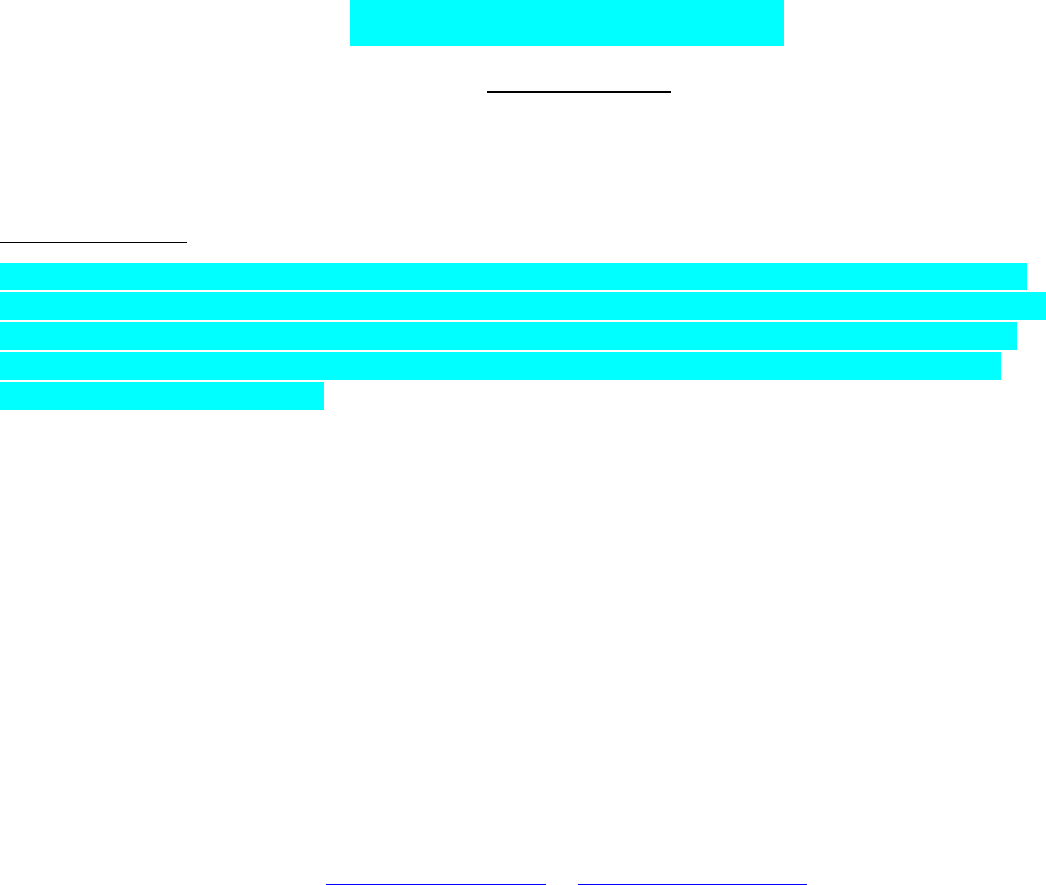
P a g e | 7
DMSI Application Packet – Revised February 2024
How the program is structured and scheduled
The Diagnostic Medical Sonography Program is a full-time program and will run over four continuous
semesters, summer included.
The program is a blended program. While there are many online assignments, sonography is a hands-on
profession and therefore requires a hands-on education and an on-campus presence.
Prerequisite classes can be taken online or from any campus, if preferred.
If accepted into the program, the first semester (8 weeks) and the first four weeks of the second eight-week
term is spent in intensive labs to prepare you for clinicals. The labs will take about 20-25 hours and class is
one additional day per week. The second eight-week term lab the first four weeks and clinicals the second
four weeks and class one day per week. Spring, fall, and summer semesters have clinicals three days per
week and class one day per week.
The sonography program is a select admit program
Program acceptance is based on points earned. The top point earning students are determined through the
points from grades in certain prerequisite classes and the USA exam score. The point earning classes are
Anatomy and Physiology I & II, Math 123, DMSI 121, and English 111.
You must have all classes that are counted for points successfully completed by the end of the 8-week term
that the application is submitted in.
Radiation physics course – DMSI 121
One of the prerequisite classes that need to be completed is the radiation physics course. This is a course that
counts for points on the application. This course is only offered as an online option for the sonography
prerequisite. To become registered for this course, you must have completed Math 123 or be enrolled in the
math class the same semester as the enrollment of the DMSI 121 class. Also, contact our advising center and
Amber Harnack or Jennafer Grasfeder from your IVY TECH email and include your C number with a
request to be enrolled in the class [email protected] or [email protected] .
Concentrations offered:
Currently we begin an adult cardiac concentration each fall and a general (Abdominal Extended and
OB/Gyn) concentration each spring. Vascular is as the community need is reported.
We want graduates to have the ability to obtain employment in the field in which they studied and also meet
the needs of the healthcare community. The concentration being offered each year is determined through
assessment of the area employment needs. This process involves surveys and contact of facilities that employ
individuals of the profession.
USA Examination:
The USA examination is an examination of intrinsic skills such as logic and reasoning, hand-eye
coordination, visual and spatial resolution. This is not like the TEAS or HESI examination; it is an
evaluation of skills more than book or memorized knowledge. The scoring is based on an algorithm
developed by the creator of the test. Each category is weighted and then combined into one overall or

P a g e | 8
DMSI Application Packet – Revised February 2024
“combined score.” The score can range from a negative 60 to a positive 50. Points for the application are
only earned on positive scores.
Every application pool will have a different testing average range. If you score a negative score, this does not
mean that you do not have a chance of being accepted into the program. We take the top total point
applicants and if the applicant pool has lower score averages, then even negative scores have the ability to be
accepted. If you do have a negative score and you are accepted into the program, you will need to understand
that you may have to work harder than others to be successful. The scores may indicate the areas you may
struggle in which then would tell you where you may need to put extra effort.
When applying for the exam, you must have your “C” number. Please note, the second digit in the student
number is a zero, not the letter “O.”
Previous degrees and college credits (Transfer Credits)
If you have college credits or even a degree already but are interested in applying for the program, you may
be able to transfer prerequisite courses already taken into Ivy Tech.
You will need to apply to Ivy Tech – the college- and once accepted you will be given a “C” number. When
you have the “C” number, you can have your OFFICIAL* transcripts sent to Ivy Tech for evaluation to see
which courses will transfer.
Any courses sought for transfer must come from a regionally accredited institution and transcripts must be
official.
*Official transcripts means that it has been sent from the educational institution to Ivy Tech and you have not
handled the document in any way. This can also be done by the original school sending the transcripts
electronically to Ivy Tech. You can have your transcripts sent via email from the issuing institution to
[email protected] If you choose to pick them up from the issuing school they must be brought to Ivy
Tech in an envelope sealed by the issuing institution. If the seal is broken, the transcripts are not considered
official.
Criminal Background Checks and Drug Testing Information
In order to participate at the clinical sites, CRIMINAL BACKGROUND CHECKS and DRUG
TESTING*** must be performed and the results must be satisfactory to the clinical sites to complete this
portion of the coursework. Although personal information will be kept confidential, names and results of
background checks, whether positive or negative, may be shared with any affiliating clinical site for the
Diagnostic Medical Sonography Program in order to determine clinical eligibility. Some clinical sites may
require you to show your criminal background check results to them.
As per College policy, if clinical site placement of the student is not successful, “…the student will be
notified that s/he may not enroll in clinical courses and any co-requisite courses. In most cases, this will
mean that the student will not be able to progress in the program and will therefore not be able to
complete the courses required for graduation.” Any existing clinical affiliate appeal processes will be
shared with the student. The student is then responsible for managing their appeal directly with the clinical
affiliate.

P a g e | 9
DMSI Application Packet – Revised February 2024
Ethics Eligibility
Completion of a criminal background check and drug screening for a Health Sciences program does not
ensure eligibility for licensure, credentialing, or future employment.
If you should have a criminal matter in your past after you have reached age 18, whether it is recent or not,
you must contact the following credentialing body for eligibility that pertains to you:
American Registry of Radiologic Technologists at 651-687-0048
American Registry of Diagnostic Medical Sonographers at 800-541-9754
Cardiovascular Credentialing International at 800-326-0268
Random Drug Testing
Clinical affiliates can conduct additional background checks and drug screenings (including random drug
screenings during clinical) at their discretion. These tests may be at the expense of the student.
***Additional criminal background checks and/or drug screenings will be required in programs for students
enrolled in clinical courses more than 12 months.
Students who are not continuously enrolled in a program until completion may be required to complete
additional checks upon re-entry to a program or admission to a different program in the School of Health
Sciences or School of Nursing. Clinical sites or the College may request additional background checks or
drug screenings at their discretion.***
Certification/ Licensing Disclosure
Ivy Tech Community College – Terre Haute campus cannot guarantee that any student will pass a
certification or licensing exam. Your success will be determined by several factors beyond the instruction
you are given in the classroom including your test-taking skills, your willingness to study outside of class,
and your satisfactory completion of appropriate practice exams. Certification and licensure exam questions
are drawn from databases of hundreds of possible questions; therefore, a thorough understanding of the
subject matter is required. The goal of Ivy Tech in providing a certification exam studies class is to assist you
in understanding the material sufficiently to provide a firm foundation for your studies as you prepare for the
exam.
Program Costs
• In-State Tuition is presently $170.07 per credit hour. The Diagnostic Medical Sonography Program is 67
credits total so tuition would approximately be $11,394.69.
o Please see https://www.ivytech.edu/tuition-aid/tuition-fees/ for the most current tuition
information.
• Books costs vary by course. The average cost for sonography books is $17.00 per credit hour.
• Consumable fees $240.00; this includes supplies for certain courses like lab supplies.
• Travel students are also required to go to clinical 2-3 times a week. This means there will be travel expenses
for gas and wear-and-tear on vehicles.
• Uniforms would include two sets of scrubs, lab coats and shoes (scrubs and lab coats must have the Ivy Tech
logo and must be purchase through the bookstore.) Cost will vary.
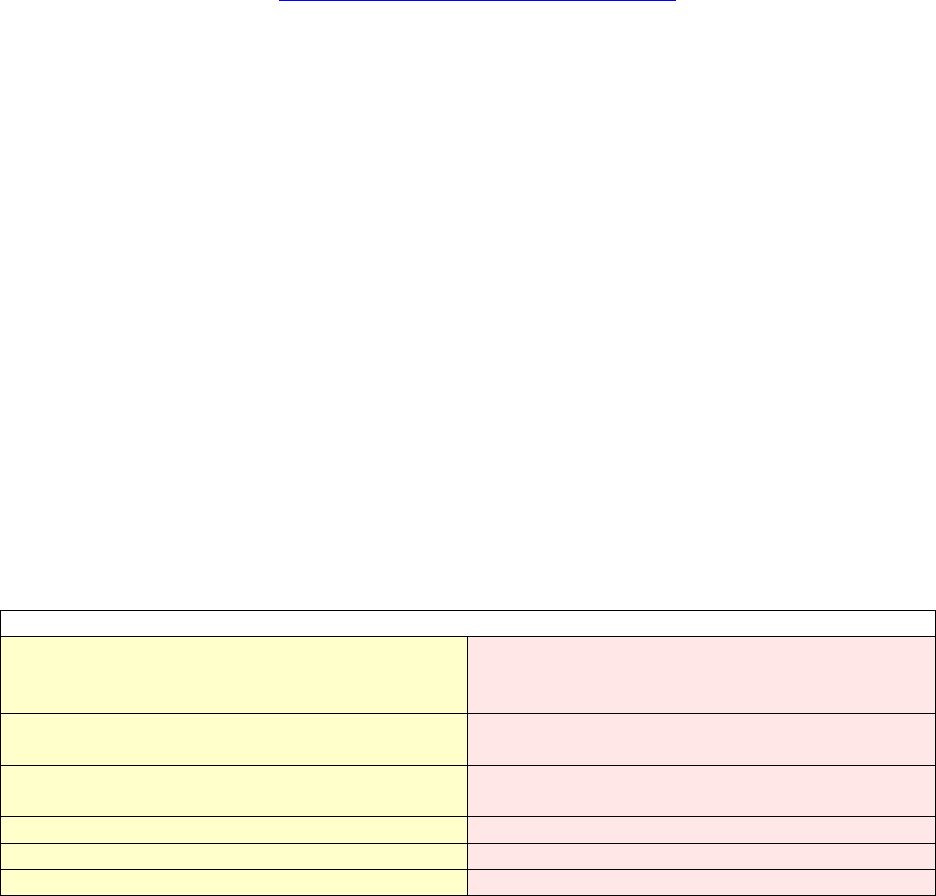
P a g e | 10
DMSI Application Packet – Revised February 2024
• Criminal Background Check and Drug Screening Initial check (Estimated) = $135; Annual re-check
(Estimated) = $95.
• Physical, Immunizations, and Healthcare Provider CPR Cost will vary.
• ******ALL ITEMS AND COST ARE ESTIMATES AND ARE SUBJECT TO CHANGE*****
Program Calendar
The program follows the same academic calendar as Ivy Tech Community, Terre Haute. To view the most current
academic calendar please go to https://www.ivytech.edu/calendar/index.html
Sonography Clinical Rotations
Students will be required to rotate to different hospitals and clinics for the clinical portion of their education. Students
will be assigned locations before each clinical rotation begins. Proximity to a clinical site does not guarantee
rotation to that site. Clinical site availability may vary according to the concentration being offered and per semester.
Clinical sites are located throughout the state of Indiana, Illinois, and Kentucky.
Each student is required to rotate to clinical sites that may be over an hour and half away from your home, regardless
of what gas prices may be. This is necessary to ensure every student has the opportunity to participate in an equitable
educational experience covering a broad range of required clinical procedures. There are no exceptions to this rule.
Students may be placed at any of these sites to complete clinical requirements for the program.
The clinical coordinator and program director will determine the clinical assignments. No student input will be
accepted, unless there is a legal issue that the program must be made aware of between the student and a particular site.
What order is the program sequenced?
If accepted, the program runs continuously through four semesters. The prerequisite courses may be taken
from any Ivy Tech campus or online. If these courses have been taken previously from another college, you
must submit your official transcripts for evaluation to know what courses must be taken for application.
The order of the program and the prerequisite courses are listed in the grid.
PREREQUISITE COURSES
*Required to apply to program and point
earning courses
Required to graduate-it is recommended to
complete before beginning of the program
APHY 101 – Anatomy & Physiology I *
COMM 101 – Speech or
COMM102 – Interpersonal Communication
MATH 123- Quantitative Reasoning*
PSYC 101 – General Psychology or SOCI 111 –
Principles of Sociology
ENGL 111 – English Composition *
IVYT 112 - Student Success Elective
DMSI 121 – Basic Radiation Physics *
APHY 102 – Anatomy & Physiology II *
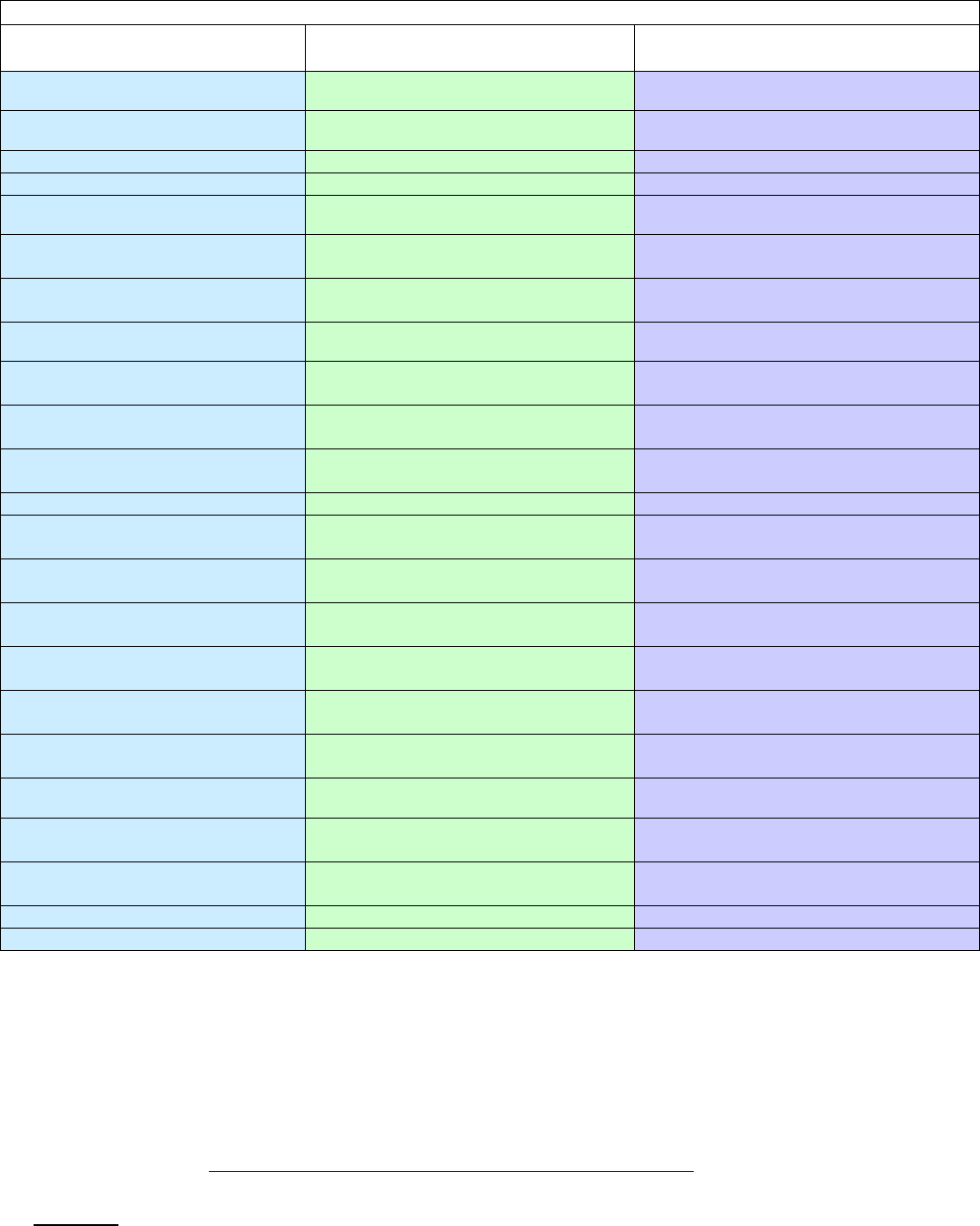
P a g e | 11
DMSI Application Packet – Revised February 2024
PROGRAM COURSES (not in order of occurrence)
GENERAL
(Abdominal Extended and OB/Gyn)
CARDIAC
Vascular
DMSI 108-Abdominal Sonography I and
Clinical Orientation Lab
DMSI 112 Ultrasound Physics I
DMSI 112 Ultrasound Physics I
DMSI 109-Abdominal Sonography II and
Clinical Orientation Lab II
DMSI 123 Ultrasound Physics II
DMSI 123 Ultrasound Physics II
DMSI 112 Ultrasound Physics I
DMSI 127 Ultrasound Physics III
DMSI 127 Ultrasound Physics III
DMSI 115- General Sonography Lab
DMSI-130 Ultrasound Physics IV
DMSI-130 Ultrasound Physics IV
DMSI 118- General Sonography Clinical
Orientation and Lab I
DMSI 135-Cardiac Sonography I and
Clinical Orientation Lab
DMSI 141 Hemodynamics and EKG I
DMSI 120- Abdominal Sonography III
and Lab
DMSI 136-Cardiac Sonography II and Lab II
DMSI 149-Vascular Sonography I and
Clinical Orientation Lab
DMSI 122- OB/ Gyn Sonography I and
Lab
DMSI 137- Cardiac Sonography Lab
DMSI 151-Vascular Sonography II and
Clinical Orientation Lab II
DMSI 123 Ultrasound Physics II
DMSI 138- Cardiac Sonography Lab and
Clinical Orientation I
DMSI 152- Vascular Sonography Lab
DMSI 124 General Sonography Clinical
II
DMSI 139- Cardiac Sonography III and Lab
DMSI 153- Vascular Sonography Clinical
Orientation and Lab I
DMSI 125 Abdominal Sonography IV
and Lab
DMSI 140 Cardiac Sonography IV and Lab
DMSI 154- Vascular Sonography III and
Lab
DMSI 126 OB/GYN Sonography II and
Lab
DMSI 141- Hemodynamics
DMSI 155 Vascular Sonography Clinical
II
DMSI 127 Ultrasound Physics III
DMSI 142 Cardiac Sonography Clinical II
DMSI 156 Vascular Sonography IV Lab
DMSI 128 General Sonography Clinical
III
DMSI 143 Cardiac Sonography Clinical III
DMSI 157 Vascular Sonography Clinical
III
DMSI 129 OB/Gyn Sonography IV and
Lab
DMSI 144 Cardiac Sonography V and Lab
DMSI 158 Vascular Sonography Clinical
IV
DMSI-130 Ultrasound Physics IV
DMSI 145 Cardiac Sonography Clinical IV
DMSI 159 Vascular Sonography IV and
Lab
DMSI 131 General Sonography Clinical
IV
DMSI 146- Cardiac Sonography Clinical V
DMSI 161 Vascular Sonography V and
Lab
DMSI 132- OB/Gyn Sonography IV and
Lab
DMSI 147- Cardiac Sonography VI
DMSI 162- Vascular Sonography Clinical
V
DMSI 133- General Sonography Clinical
V
DMSI 148 Cardiac Sonography Clinical VI
DMSI 163 Vascular Sonography Clinical
VI
DMSI 134-General Sonography Clinical
VI
DMSI 164 EKG & Hemodynamics II
DMSI 164 EKG & Hemodynamics II
DMSI 165- Sonography Orientation and
Patient Care
DMSI 165- Sonography Orientation and
Patient Care
DMSI 165- Sonography Orientation and
Patient Care
DMSI 166-Sonography Patient Care and
Cross-Sectional Anatomy
DMSI 166-Sonography Patient Care and
Cross-Sectional Anatomy
DMSI 166-Sonography Patient Care and
Cross-Sectional Anatomy
DMSI 293-Sonography Exam Review
DMSI 293-Sonography Exam Review
DMSI 293-Sonography Exam Review
DMSI 294-Sonography Exam Review
DMSI 294-Sonography Exam Review
DMSI 294-Sonography Exam Review
Diagnostic Medical Sonography
*PHYSICAL DEMANDS AND REQUIREMENTS
Sonography is a challenge on many aspects. While most think about the very important visual component,
there are many physical demands that are often not considered. Below are the minimum physical requirements
and all can be found at https://www.onetonline.org/link/summary/29-2032.00
• Standing - Standing is required 95-100% of the time throughout the assigned clinical hours. Essentially,
the position cannot be performed without the ability to stand for long periods of time.

P a g e | 12
DMSI Application Packet – Revised February 2024
• Walking - Walking is required 90-100% of the time during the course of the assigned clinical hours.
• Climbing - Climbing is not required except for stairs.
• Pushing - Pushing is required for moving the patients to and from the x-ray table.
• Pulling - Pulling is required for both short and long durations when moving patients onto tables and
when transporting to and from units. Imaging equipment may include tubes, monitors, or portables
requiring significant physical exertion.
• Lifting – Up to 50 lbs. Most significant: must be able to assist patient to and from exam table.
• Carrying - Students consistently carry equipment and other supplies. See lifting.
• Exposure to Disease - On a daily basis, involves caring for the patients with known and potential
infections.
• Handling Repulsive Tasks - Involves handling and disposing of body secretions, blood, stool, etc. The
general cleaning and maintenance of an incontinent patient is not uncommon.
• Working in Confined Places - Confined places included the processing darkroom, which is frequently
used each day, each time being 1-5 minutes in duration. Must be able to work around constantly running
water.
• Exposure to Potentially Harmful Radiation - Daily contact with radiation producing devices.
• Visual –20/100 vision, correctable (with glasses or contacts) to 20/30 in one eye or 20/100 vision
correctable (with glasses or contacts) to 20/40 in both eyes. Students must be able to distinguish colors.
• Auditory and Speech – Student must be able to respond to auditory codes, phones, equipment noise,
and/or verbal expressions from patients and physicians for proper patient care. The student must be able
to verbally communicate medical information to the patient, staff, physicians, and general public.
* If you do not meet these requirements, check with the disability representative at your campus for
additional assistance.
If accepted into the program, you will be required to have a physical that will evaluate for certain functions.
The list is on the following page.

P a g e | 13
DMSI Application Packet – Revised February 2024
Diagnostic Medical Sonography
PHYSICAL DEMANDS AND REQUIREMENTS
Frequency: 0 = Occasionally (1-33%) F= Frequently (34-66%) C= Constantly (67-100%)
Function
Program-Specific Examples
Program-Specific
Examples
Gross
Motor
Skills
• Move within confined spaces
• Sit and maintain balance
• Stand and maintain balance
• Reach above shoulders (e.g., put away supplies)
• Reach below waist (e.g., plug electrical appliance into wall outlets)
F
Fine Motor
Skills
• Pick up objects with hands
• Grasp small objects with hands (e.g., syringe, pencil)
• Write with pen or pencil
• Key/type (e.g., use a computer)
• Pinch/pick or otherwise work with fingers (e.g., manipulate a syringe)
• Twist (e.g., turn objects/knobs using hands)
• Squeeze with hand (e.g., blood pressure cuff)
C
Physical
Endurance
• Stand (e.g., at client side during minor or therapeutic procedure)
• Sustain repetitive movements (e.g., CPR)
• Maintain physical tolerance (e.g., work entire shift)
C
Physical
Strength
• Push and pull 50 pounds (e.g., position clients)
• Support 50 pounds (e.g., ambulate client)
• Lift 50-100 pounds (e.g., pick up a child, transfer patient)
• Move light objects weighing up to 10 pounds
• Move heavy objects weighing from 25 to 100 pounds
• Defend self against combative client
• Use upper body strength (e.g., perform CPR, restrain a client)
• Squeeze with hands (e.g., operate fire extinguisher)
F
Mobility
• Twist
• Bend
• Stoop/squat
• Move quickly (e.g., response to an emergency)
• Climb (e.g., ladders/stools/stairs)
• Walk
F
Hearing
• Hear normal speaking level sounds (e.g., person-to-person interview)
• Hear faint voices
• Hear faint body sounds (e.g., blood pressure sounds)
• Hear in situations when not able to see lips (e.g., when masks are used)
• Hear auditory alarms (e.g., monitors, fire alarms)
C
Visual
• See objects up to 20 inches away (e.g., information on a computer screen, skin
conditions)
• See objects up to 20 feet away (e.g., patient in a room)
• See objects more than 20 feet away [e.g., client at end of hall)
• Use depth perception • Use peripheral vision
• Distinguish color (e.g., color codes on supplies, charts, bed)
• Distinguish color intensity (e.g., flushed skin, skin paleness)
C
Tactile
• Feel vibrations (e.g., palpate pulses)
• Detect temperature (e.g., skin, solutions)
• Feel differences in surface characteristics (e.g., skin turgor, rashes)
• Feel differences in sizes, shapes (e.g., palpate vein, identify body landmarks)
• Detect environmental temperature (e.g., check for drafts)
F
Smell
• Detect odors from client (e.g., foul smelling drainage, alcohol breath, etc.)
• Detect smoke
• Detect gases or noxious smells
F
Reading
• Read and understand written documents (e.g., policies, protocols)
F

P a g e | 14
DMSI Application Packet – Revised February 2024
Function
Program-Specific Examples
Program-
Specific
Examples
Arithmetic
Competence
• Read and understand columns of writing (flow sheet, charts)
• Read digital displays
• Read graphic printouts (e.g., EKG)
• Calibrate equipment
• Convert numbers to and/or from the Metric System
• Read graphs (e.g., vital sign sheets)
• Tell time
• Measure time (e.g., count duration of contractions, etc.)
• Count rates (e.g., pulse)
• Use measuring tools (e.g., thermometer)
• Read measurement marks (e.g., measurement tapes, scales, etc.)
• Add, subtract, multiply, and/or divide whole numbers
• Compute fractions (e.g., medication dosages)
• Use a calculator
• Write numbers in records
C
Emotional
Stability
And
Interpersonal
Skills
• Establish therapeutic boundaries
• Provide patient with emotional support
• Adapt to changing environment/stress
• Deal with the unexpected (e.g., client going bad, crisis)
• Focus attention on task
• Monitor own emotions
• Perform multiple responsibilities concurrently
• Handle strong emotions (e.g., grief)
• Negotiate interpersonal conflict
• Respect differences in clients
• Establish rapport with clients
• Establish rapport with co-workers
C
Communication
Skills
• Teach (e.g., client/family about health care)
• Explain procedures
• Give oral reports (e.g., report on client's condition to others)
• Interact with others (e.g., health care workers)
• Speak on the telephone
• Influence people
• Direct activities of others
• Convey information through writing [e.g., progress notes)
C
Critical
Thinking
• Identify cause-effect relationships
• Plan/control activities for others
• Synthesize knowledge and skills
• Sequence information
C
Analytical
Thinking
• Transfer knowledge from one situation to another
• Process information • Evaluate outcomes
• Problem solves • Prioritize tasks
• Use long term memory • Use short term memory
F
Diagnostic Medical Sonography
APPLICATION AND SELECTION PROCESS
If You Are Planning to Apply to one of the Sonography Concentrations, PLEASE Read This
Information Carefully
The Sonography Program has a limited enrollment because of the limited number of clinical sites. Applications to the
program and/or completion of prerequisite courses do not guarantee admission into the technical portion of the
program. The number of students accepted into each cohort depends on the clinical availability. The numbers typically
fall between 15-22.

P a g e | 15
DMSI Application Packet – Revised February 2024
Diagnostic Medical Sonography
Application Requirements:
1. Apply to Ivy Tech Community College and have all transcripts sent accordingly.
2. Please refer to the application user guide linked on the sonography page.
Sonography page- https://www.ivytech.edu/programs/all-academic-programs/school-of-health-
sciences/diagnostic-medical-sonography/
Application user guide- https://docs.google.com/document/d/e/2PACX-
1vSsGIhDqzc1ZIbAkOTHUcbXFRfDxTsNnQYy-gn0OwYfXXneTHbdrGi8OCWzpV1p_w/pub
3. Successfully complete the following five (5) prerequisite courses by the end of the 8 weeks of the semester you
are applying in. These courses will be awarded points for the final grade received:
• APHY 101 – Anatomy and Physiology I
• APHY 102 - Anatomy and Physiology II
• ENGL 111 – English Composition
• DMSI 121– Basic Radiation Physics
• MATH 123 – Quantitative Reasoning
4. Successfully complete all other prerequisites. The following courses need to be completed in order to graduate.
We recommend these courses be completed before the beginning of the program as the program requirements
are great and the time commitment is large. The grades in these courses are not used in calculations for student
selection. These courses are as follows:
• PSYC 101 or SOCI 111 – Either Introduction to Psychology or Introduction to Sociology
• COMM 101 or COMM 102 – Either Public Speaking or Interpersonal Communications
• IVYT 112 - Student Success Elective
5. Take the USA- Ultrasound Student Assessment – Link for instructions to schedule below.
https://docs.google.com/document/d/1J-Oh_tw5RvZUI7xsFZExmipRI47x9LKHVOBB83ErM-g/edit
PLEASE READ ALL OF THE INFORMATION BELOW ABOUT THE USA EXAM
• This is an examination of intrinsic skills that are essential for the sonography profession. There is no studying
required.
• The test will evaluate hand-eye coordination, logic, reasoning, visual and spatial resolution, and
judgement as well as other areas.
• Students may take this exam only 1 time.
• When signing up for the exam, you must provide your “C” number. Please note, the second digit in the
student number is a zero, not the letter “O.”
• The student must pay the approved testing fee.
• There is no time limit for this test. Typical time for test completion ranges from 30 minutes to 2 hours.
• The “Combined Score” will be used as points on the application.
• In order to receive your score for the test, you must EMAIL- Jennafer Grasfeder. Email address is on page 18.

P a g e | 16
DMSI Application Packet – Revised February 2024
Getting Accepted
The following is an explanation about the process of accepting students into the Ivy Tech Community College
Diagnostic Medical Sonography program.
Acceptance into the Program: Acceptance into the Sonography Program at Ivy Tech Community College, Terre
Haute is a competitive based on grades earned in the required five (5) general education courses and points awarded
for the combined score of the USA exam. Tie breaker would be based then on GPA.
Points for the Program: For each final letter grade received in the five (5) prerequisites courses, the student will
receive points according to the following scales:
For APHY 101, 102, MATH 123, and DMSI 121 Courses For ENGL 111 Course
A = 30points A = 15 points
B = 20points B = 10 points
C = 10points C = 5 points
D = 0 points D = 0 points

P a g e | 17
DMSI Application Packet – Revised February 2024
Frequently Asked Questions (FAQ)
1. Is the program accredited and how many students do you accept every year?
General (Abdominal Extended & OB/Gyn), Vascular and Adult Echocardiography concentrations are accredited by CAAHEP
on the recommendation of the JRCDMS. 15-22 Sonography students will be accepted. This is determined by clinical
availability at the time of the program.
2. How many applications do you receive?
It varies from year to year, but average is around 100.
3. Is there a waiting list?
No, we do not use a waiting list. If an applicant is not selected, then he or she must reapply for the following cohort.
4. What is your deadline for the application?
The deadline is in the semester the online application is open. The dates are posted on the link from the sonography page in the
application user guide.
Sonography page- https://www.ivytech.edu/programs/all-academic-programs/school-of-health-sciences/diagnostic-medical-
sonography/
Application user guide- https://docs.google.com/document/d/e/2PACX-1vSsGIhDqzc1ZIbAkOTHUcbXFRfDxTsNnQYy-
gn0OwYfXXneTHbdrGi8OCWzpV1p_w/pub
5. Where do I take the USA exam?
Currently the exam may be taken online currently. This test is remotely proctored. https://docs.google.com/document/d/1J-
Oh_tw5RvZUI7xsFZExmipRI47x9LKHVOBB83ErM-g/edit
6. How can I study for the USA exam?
There is no study guide, therefore no studying is required. This is an exam of your personal qualities. These are qualities
essential to the profession of sonography. Some of the qualities can be learned, some cannot and are completely inherent. There
are some areas students may see a negative score in the raw cut score. This does not mean failure; it only identifies weaker
areas in a particular quality.
7. How are students selected?
The selection process is decided by a point system. Points are awarded for the following:
• Final grades of the following: APHY 101 & 102 – Anatomy and Physiology I & II, ENGL 111 – English Composition,
MATH 123– Quantitative Reasoning, DMSI 121- Basic Radiation Physics.
• Combined score using the USA exam.
• The top points earning students are offered positions. If a student declines their position, then it is offered to the next
highest point earner.
8. What do I do if I have already completed a college degree?
Have your official college transcripts sent to Terre Haute Ivy Tech to be evaluated. The evaluation will determine what classes
will transfer and what additional courses need to be completed. If you are attending another Ivy Tech, please request official
transcripts from other colleges to be sent to your home campus for evaluation before turning in your application materials.
10. When are students selected? How will I know if I am accepted?
The selection process will be notified through your Ivy Tech email. Make sure the Ivy tech email address you submit on the
application is valid and one you will check often.
11. What do I need to do if I am accepted?
If you are accepted, you will need to do the following:
• If you are accepted, you must accept the acceptance email within 48hrs.
• Attend required orientation.
• Have current immunizations verified by a medical doctor.
• MMR, Varicella, Hepatitis B, Influenza, Tdap
• Have current 2-Step TB skin test.
• COVID vaccine- proof of vaccine or approved declination (once accepted into program)
• Have current eye exam.
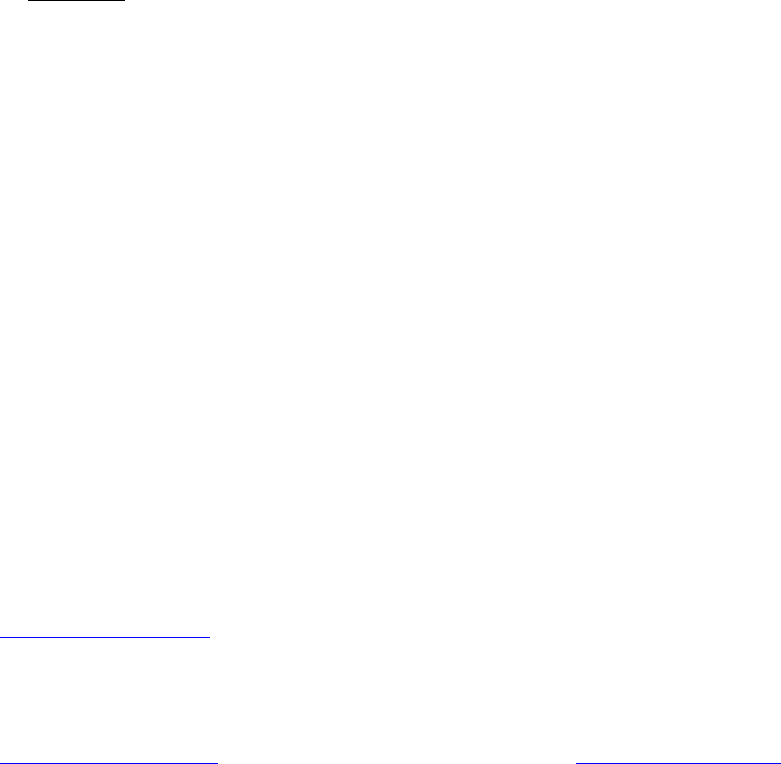
P a g e | 18
DMSI Application Packet – Revised February 2024
• Have current Healthcare Provider CPR certification.
• Submit to a criminal background check and drug screen.
• Required to travel to the various clinical sites.
Details regarding the above will be discussed at the required orientation.
12. What happens if I am not accepted?
If the student is not accepted into the program, the student may…
• Reapply the following year.
• Students must submit a new application.
• Consult with your advisor for other programs that you may complete or be eligible to pursue.
• Discuss with your Program Faculty Advisor on areas that need to be improved.
• Discuss with your Program Faculty Advisor an alternate plan.
13. What will I learn in the Program?
Sonography – The program is designed to prepare students to perform Sonographic procedures. Students may be introduced to
other imaging modalities but will not learn how to do those medical procedures.
14. Can I work and be in the program?
You can but we do not recommend it. The regular hours of attending class and going to clinical and or lab range from 20-25
hours a week depending on the semester, and you still need study time on top of that. Summer semester requires more hours in
that clinicals are 3 days per week.
15. What if my criminal background check or drug screens comes back positive?
The student may or may not be able to complete the program clinical portion of the program. The clinical portion is a
requirement for graduation. We strongly encourage you to inform the program chair of any possible issues that may show up
on your background check or drug screen.
16. Are all Sonography concentrations offered at the same time?
No. We alternate the concentrations. If you are interested in a specific concentration, please contact the program for more
information.
Contact --- for more information.
If the questions are included in this packet, you will be referred back to this packet.
Program Personnel
Jennafer Grasfeder, MLD, RDMS, RVT, RDCS, RT(R)
Program Director
812-298-2237
Kaye Amend, BA, RVT, RDCS Amy Landry
Clinical Coordinator DMSI Faculty
812-298-2311 812-298-2391
